Tyler W. Kurt [Ed.] (2024, July 1) After Dinner Conversation: Government Ethics Edition. [Literary Magazine]
I follow After Dinner Conversation on Substack, so when I had the opportunity to read an advance copy (ARC) of curated stories, I jumped. I love a good philosophical debate, and as a teacher (former teachers still think like teachers), I'm always on the prowl for good stories that generate discussion. Add a government ethics theme, and I am all in.
Ten curated stories cover the gamut of speculative ethics in law and government. Some are better than others. Most stories provoke thought, and some of the included discussion questions promise animated conversation. I took notes throughout, but will share here my superlatives.
"The Book of Approved Words": Clearest connection Orwellian Newspeak.
"The Draft": Most logical fallacies: Argument from consequences, False dilemma, No true Scotsman, and Slippery slope, among others. Most likely to sever friendships.
"For Your Safety": Most frighteningly not too far-fetched.
"Understanding Ice Cream": Most thought-provoking. Most likely to inspire excellent conversation. Best use of alliteration. This one is worth the price of the book.
"Prohibition": Most notable for highlighting potential extremes of animal rights activism.
"The Decay": Most likely drawn from current practices in some countries.
"The Kill Registry": Most likely to be made into an episode of Black Mirror on Netflix.
"The Crate": Most interesting story for a teen audience.
"Form Seven Alpha": Most unexpected ending (I'm still getting over that one.) Best use of imagery: "printed on cheap paper with low quality ink that smudges under my fingers."
"Euthanasia": Most chilling.
Some questions along the way that sparked my attention (edited for clarity and limiting spoilers):
* What is the societal purpose of the elderly?
* What drives narcissism? How does narcissism lead to polarization and division?
* What are acceptable addictions?
* What should the limitations of government over individual lives be?
Andy Weir (2019) Randomize. [Audible]. Narrated by Janina Gavankar. Part of Forward, a curated collection of short stories. Brilliance Publishing.
A great narrator makes this short story (under an hour to listen) move with purpose. The setting is Las Vegas, specifically one casino's KENO game. KENO games rely on random number generators and regular turnovers of cash. It's a profitable game for the house with an advantage of about 25%. Protecting that advantage is the key to this story. Babylon Casino hires a genius to write software to protect the number-generator using a quantum computer system.
In spite of my quantum illiteracy, the story of good-guy, bad-guy, good-guy-turned-bad-guy still kept my attention. I enjoyed the back-and-forth between character arcs and the fresh dialogue. It's evidence that a good story doesn't require technical expertise. I suspect someone who understands quantum computing would enjoy it even more.
Philippe Claudel (2009) Brodeck: a novel. [Kindle]. Translated by John Cullen. Anchor Publishing.
One of my tutoring students introduced me to this book. He was writing a paper on it, so I looked it up so I could help him better, but it intrigued me. The student said it was good, so I picked up a copy. I mean, a book that a high school student liked had to be good, right?
This book is serious, heavy, and in many ways horrifying, particularly because what Claudel unveils is the underlying evil nature of humans. The story is set in a post WW2 European village (France? Poland? Hungary?) that housed German soldiers for a while, but wasn't significantly altered by the war. Only three of their young men were presumed to have died in battle, but one of them, Brodeck, returned, scarred by his time in concentration camp. The village appears idyllic, but there is an undercurrent of deception, fear, and evil that surfaces as the inciting incident of the story.
A stranger visits the town, accompanied only by his horse and his donkey. He is silent, dresses extravagantly, and does not seem to notice that his presence upsets the balance of belonging. Brodeck, although the village was his adopted home for most of his life, also felt like an outsider and so felt a connection to this strange man. The story unfolds as something terrible befalls the stranger and Brodeck is tapped to write a report of the incident because he had a typewriter. In the composition of the official story, Brodeck also writes the full facts of the event along with his own family's story of wartime atrocities, laying truth over news. The official report is wiped of blame or responsibility, so that the village can maintain its balance.
I understand why this book would be a choice for a high school literature class. It contains conflict, imagery, metaphor, symbolism, tension, a narrator that is both reliable and unreliable, and stunningly beautiful prose, even in translation. However, it is hard to read, partly because of the content and partly because the story meanders slowly as each new layer of horror unfolds.
Memorable lines:
(Describing a river) "We have an impetuous, romping torrent, which hisses, cries, collides, churns up gravel, and wears down the rocks showing through its surface as it hurls water and foam into the air. The Staubi's a true, untamed mountain savage, clear and sharp as crystal…" (48).
"Stupidity is a sickness that goes very well with fear" (280).
"You who remembers everything, who remembers too much?...It's time to forget, Brodeck. People need to forget" (308).
Benjamin Stevenson (2022). Everyone in my Family has Killed Someone. Mariner Books.
If you think murder mysteries must be dark, foreboding, and full of red herrings, you will hate this book. It is brash and funny. The author tells you how many people die and on what page. He offers Ronald Knox's 1929 "Ten Commandments of Detective Fiction" with a convenient place to dog-ear that page for reference. The front matter matters, and the acknowledgements are just as fun to read as the story. As an author, Stevenson is quite generous, reminding the reader of the rules and keeping track of clues, along with plenty of foreshadowing--although it's more like fore-telling because he doesn't work in shadows.
The story is of a family that really does put the fun in dysfunctional. One brother is being released from jail for murder, so the family plans a welcome home reunion somewhere other than home. Bodies turn up starting on page 1. Anything else you need to know is in the prologue.
This is a perfect beach read--or a choice for a snowy day by the fire in a mountain chalet. Don't take it too seriously--go along for the ride.
Madeleine L'Engle (1971) The Other Side of the Sun [Audible, 2018] Narrated by Sarah Zimmerman. Brilliance Publishing.
Family secrets, Voodoo, and Faith combine to create a story of the coastal Southern US in the early 20th century. Racism defined families, and L'Engle holds nothing back as she describes the terror of lynchings, the impossibility of true freedom for former enslaved people, and the desire for revenge--of both Black and White.
Full disclosure: Madeleine L'Engle is my favorite American author, followed closely by Flannery O'Conner. Both women were smart, articulate, observant, and brutally honest. Both found a refuge in Jesus, although their affiliations were different: O'Connor was Catholic and L'Engle mostly Episcopalian, although the denomination was less important than the work the local church did. Neither woman was conventional, but rather, strong women who spoke their minds and wrote to provoke thought.
The Other Side of the Sun chronicles a summer in coastal South Carolina wherein a young English bride is sent while her diplomat husband is sent to Africa. The Renier family, made up of an older generation, both Black and White, who had lived through the unCivil War. The spinster aunts quarrel and quibble over everything, from identifying quotes (a favorite game) to religion and mortality. Honoria and Clive, who actually own the house the family lives in, act as servants because, as former slaves. In the scrub down the beach from the Reniers lived a community of Zenumin (a loose reference to a feminine demon of Zohar Kabbalah spiritism). The Zenumins play a major role in the conflict of the story, although the themes of slavery, racism, bigotry, superstition, power, and faith provide powerful movement forward.
There are three women whose spiritual lives intersect with young atheist bride, Stella: Granddam Zenumin, whose witchcraft was feared by most people, Mado, the deceased French mother of Stella's husband, Theron, whose journals revealed a deep faith in God, and Honoria, the former enslaved woman who was a princess in Africa with powers from her ancestral traditions and her Christianity. Honoria binds the family together and her character holds the keys to the unfolding story.
L'Engle's faith is not a battering ram, but it is a definite influence on the novel. She includes familiar Bible stories along with her unconventional beliefs, like scientific evolution being a miracle equal to the biblical Creation account. Without the ribbon of faith, the novel might be interesting historically, but it would not require the deep thoughtfulness that L'Engle pursued in all her work.
Favorite lines (the text is available on Kindle Unlimited)
"Oh Illyria, Illyria. The home palace. The place of love. The place where living taught me something about dying, and where death taught me even more about life' (47).
"My guardian angel is fully what he is, performing wholly the function for which God has created him. At the moment, this function is to watch over me. After I die, he might be assigned to sweeping stardust out of a corner of the sky. But because he is doing what he is created to do, radiantly, joyfully, no matter how difficult I make it for him, I can catch some of his joy. Without my angel's joy, where would I be?" (66-67).
"'Terror is not fear, Miss Stella. It is right and proper that we should feel terror before the power of the Lord.' 'Is love terrible, Clive?' 'Yes, Miss Stella'" (320).
"The end of time is not nothing, is not nought…The end of time is the glory on the other side of the sun" (214).
And that’s a wrap for July! Which book might you pick up?

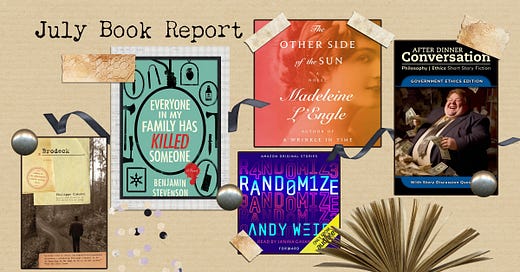



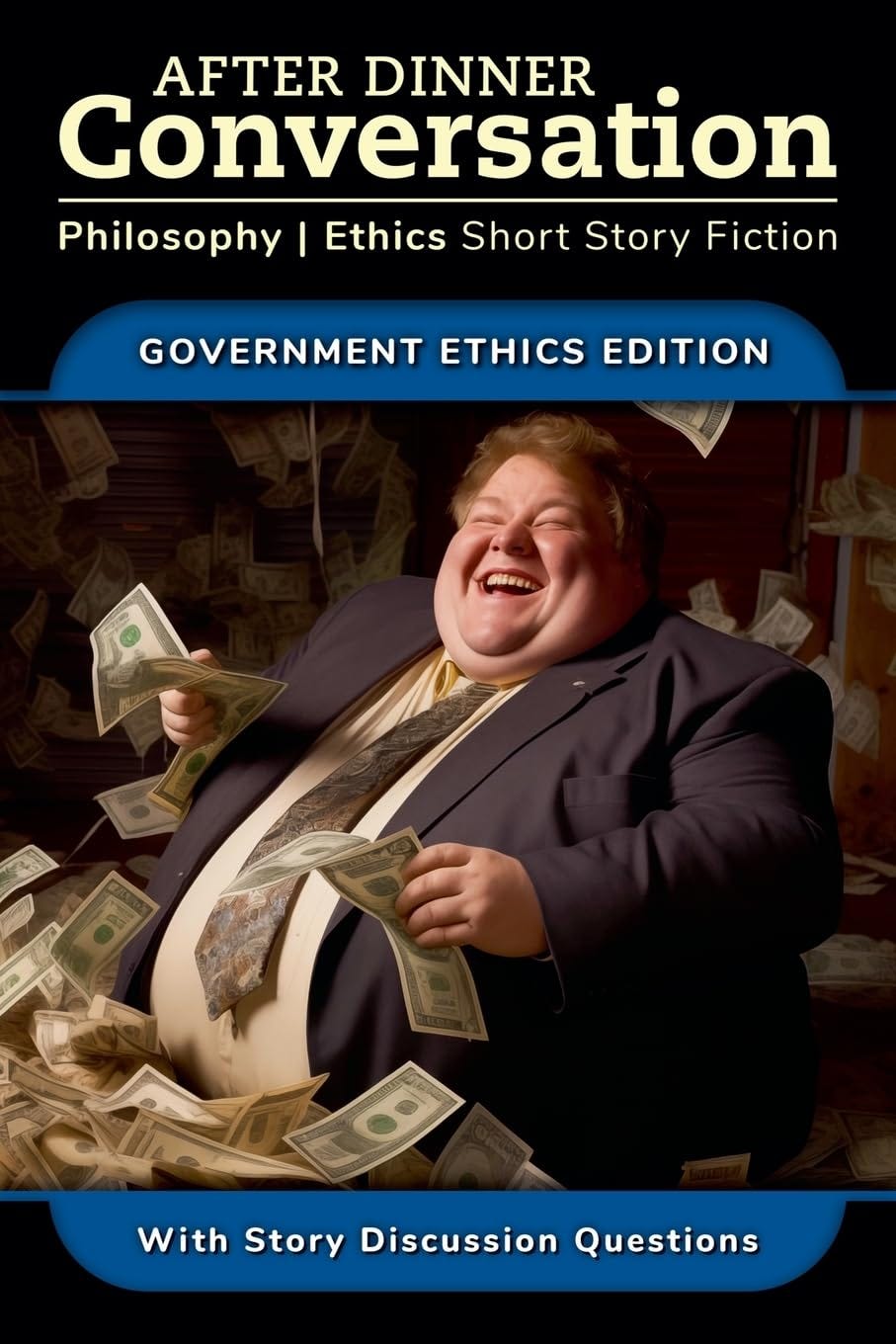
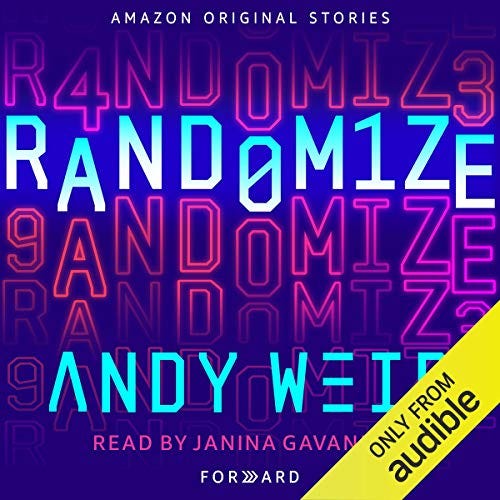
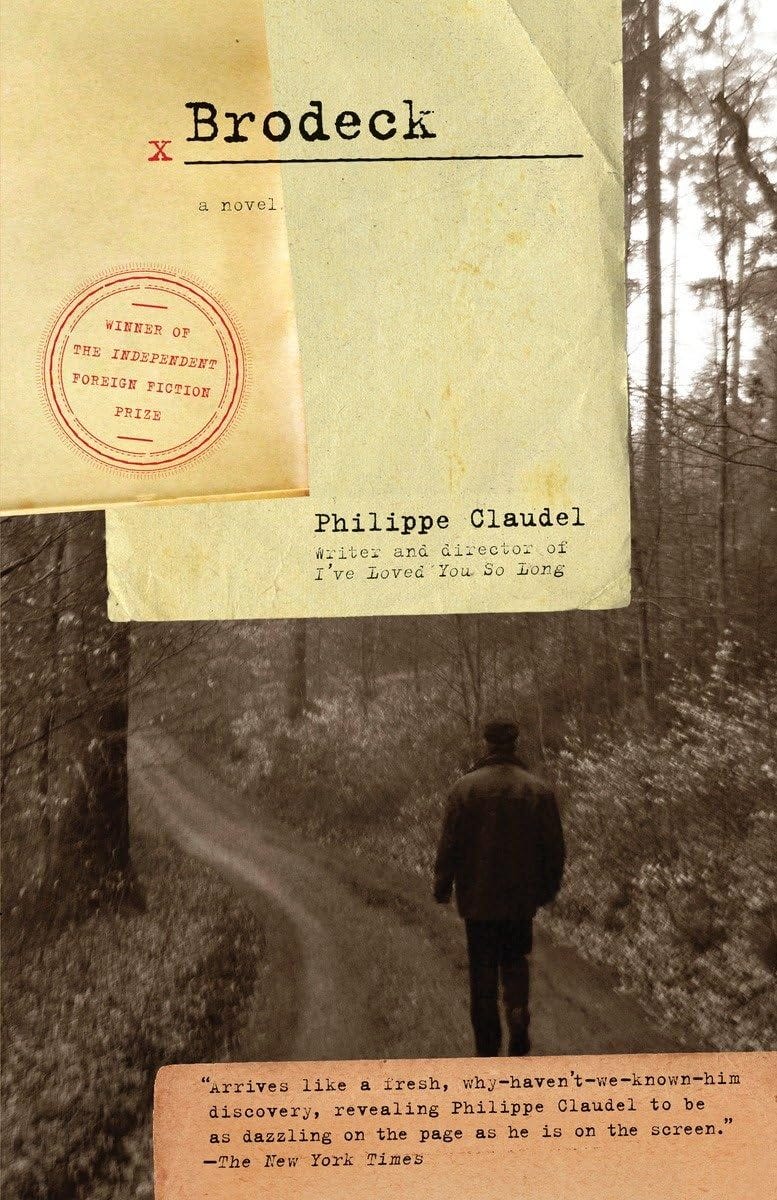

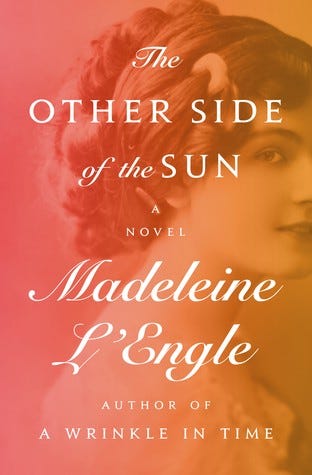


Thanks for the review! You’re awesome!
Stephanie, I’m unfamiliar with Janina’s work so I appreciate the introduction. Hope you’re well this week? Cheers, -Thalia